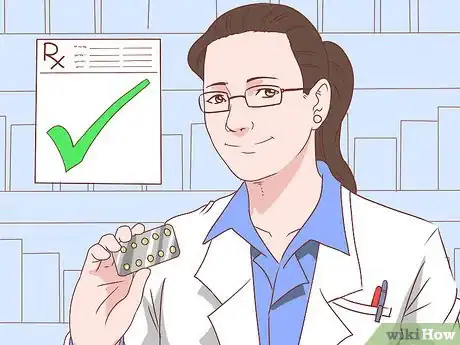This article was medically reviewed by Luba Lee, FNP-BC, MS. Luba Lee, FNP-BC is a Board-Certified Family Nurse Practitioner (FNP) and educator in Tennessee with over a decade of clinical experience. Luba has certifications in Pediatric Advanced Life Support (PALS), Emergency Medicine, Advanced Cardiac Life Support (ACLS), Team Building, and Critical Care Nursing. She received her Master of Science in Nursing (MSN) from the University of Tennessee in 2006.
There are 15 references cited in this article, which can be found at the bottom of the page.
This article has been viewed 151,760 times.
A healthy uterine lining, or endometrium, helps women have regular periods and get pregnant. If you have a thin uterine lining, you might be experiencing trouble getting pregnant. Fortunately, a thin endometrium can be treated with some lifestyle modifications, and you can work with your doctor to thicken the endometrium with medical methods. Stay positive – many women are able to increase their uterine lining and improve their chance of pregnancy!
Steps
Using Natural Methods
-
1Exercise daily. Exercising increases the blood flow throughout your body, and that includes blood flow to your uterus. Good blood flow builds a better endometrium. Take at least thirty minutes out of your day to be active – whether you like to swim, run, bike, do yoga, or just take a walk.
- If you have a job that requires you to sit still a lot, try to get up and move around for two minutes out of every hour.
-
2Get at least 7 hours of sleep each night. Stay well rested to keep your hormone levels stable – estrogen and other hormones balance out while you sleep.[1] Try to develop a healthy sleep pattern to ensure you get 7-9 hours of sleep nightly. Try the following to improve your sleep pattern:
- Set a specific time to go to bed and wake up each day. Try to go to bed around 10-11 pm.
- Avoid napping during the day.
- Save your bedroom for sleep – don’t watch TV in bed, for instance.
- Have a relaxing nighttime routine, like taking a warm bath or giving yourself a hand massage.
- Sleep in a cool, dark room.
Advertisement -
3De-stress. Stress and the chemicals it releases can affect your body negatively, including your hormone balance. Manage your stress by taking time each day to relax. Try yoga, meditation, a creative project like writing or painting, aromatherapy, or anything else that relaxes you. If you have a stressful home or work life, try to practice mindfulness.
-
4Try a fertility diet. Your diet may affect your fertility. Aim to eat a diet rich in vegetables, fruits, and whole grains. A high-fat, low-carb diet may also help. If possible, get more of your protein from vegetables and beans than meat. Avoid trans-fats and processed foods. [2]
-
5Take herbal supplements. Though these are not scientifically proven to increase uterine thickness, taking certain herbs may help increase your circulation and thus improve blood flow to your uterus, or may amp up your body’s estrogen supply. Many supplements can be found at your pharmacy, health food store, or online (but be sure to buy from a reputable seller). Check with your doctor or pharmacist before starting an herbal supplement – they’re natural, but they can still interact with other medications or medical conditions. Consider the following to boost or balance estrogen levels, or increase circulation:[3]
- Wild yam
- Black cohosh
- Dong quai
- Licorice
- Red clover
- Red raspberry leaf tea
-
6Try acupuncture. Acupuncture helps regulate your menstrual health by improving your uterine blood flow. Visit a licensed acupuncturist for treatment. They will apply needles to specific points in your body to help you improve your circulation, regulate hormones, and promote healing.[4]
-
7Avoid practices that decrease blood flow. Just as you can try practices to increase your blood flow, you should avoid doing anything that minimizes your blood flow. Some of the most common practices that decrease blood flow are:
- Smoking: Quit smoking! It’s hazardous to your health and decreases blood flow.
- Drinking caffeine: Aim to minimize your caffeine to 1 cup per day. Cut back caffeine gradually to avoid withdrawal effects.
- Taking decongestants: Allergy and sinus medications that contain phenylephrine or other “vasoconstrictors” narrow blood vessels, so try to use other products without this ingredient.
Trying Standard Medical Practices
-
1Visit your doctor. If you’re having an irregular period or a difficult time getting pregnant, visit your regular doctor or your OB/GYN. There are many reasons this can occur, so have a physical examination to rule out other causes than thin uterine lining. If a thin endometrium is your problem, your doctor will be the best person to help you decide on treatment.
- It’s important to determine the cause of your thin endometrium to best treat the condition.
-
2Try estrogen therapy. The first step to increase uterine lining is usually to manipulate your hormones using estrogen therapy.[5] Your doctor may prescribe you a method of birth control that contains estrogen, or give you estrogen in the form of a pill, patch, gel, cream, or spray.
- Taking estrogen can increase your risk for blood clots, heart disease, and some cancers. Discuss your health history and family history with your doctor.
-
3Take a vasodilator medication. Your uterine lining needs good blood flow to grow, so restricted arteries can cause a thin endometrium.[6] Talk to your doctor about whether you can take a medication that expands your blood vessels, called a vasodilator, to improve blood flow to your uterus.
- People with certain medical conditions should not take vasodilators, and these medications can cause side effects like fast heartbeat, fluid retention, headache, chest pain, and nausea.[7] Discuss your health history with your doctor before starting any medication.
-
4Increase your Vitamin E. Taking vitamin E may improve blood flow to the uterine lining and improve endometrial thickness. Eat foods rich in vitamin E, and talk to your doctor about taking a vitamin E supplement – sometimes called tocopherol.[8] The recommended daily intake of vitamin E is 15mg for women; ask your doctor about higher doses to increase uterine lining – 600mg were given to women in studies.[9] Foods high in vitamin E include:[10]
- Almonds, pine nuts, hazelnuts, peanuts, and peanut butter
- Raw seeds like pumpkin, sunflower, and sesame
- Swiss chard, kale, and spinach
- Mustard greens, turnip greens, and parsley
- Avocado, broccoli, tomato, and olives
- Mango, papaya, and kiwi
- Wheat germ oil, safflower oil, and corn oil
-
5Check the levels of iron in your blood. Iron deficiency can cause a thin uterine lining. Ask your doctor to do a blood test to check your iron levels. If your levels are low, you may need to eat more iron-rich foods or take a supplement.
- Meat and fish are the best sources of iron.
- Vegans and vegetarians are at higher risk of iron deficiency. Make sure to eat iron-rich grains and vegetables, such as quinoa, lentils, spinach, and tofu.
-
6Take an l-arginine supplement. There is good scientific evidence that taking an l-arginine supplement helps people with heart trouble and leg pain due to clogged arteries.[11] Because of its ability to expand arteries and improve blood flow, taking l-arginine may help to increase uterine lining.[12] You can get these supplements at your pharmacy or health food store.
- There is no set dosing limit for l-arginine, but it can be taken anywhere in the range of 0.5-15mg for different ailments. Studies have used 6 g/day to treat thin uterine lining. Talk to your doctor about dosing and whether this supplement is right for you.
Considering Newer Medical Options
-
1Ask about low-dose aspirin therapy. Taking low-dose aspirin has been shown to improve some women’s rate of pregnancy, though it’s in question whether this is due to increasing the thickness of the uterine lining.[13] Only take aspirin with your doctor’s approval, after discussing your health history.
-
2Discuss pentoxifylline with your doctor. Pentoxifylline (Trental) is a medication that increases your blood flow. It’s been combined with vitamin E to thicken the uterine lining of women trying to get pregnant.[14] It can make you dizzy and may upset your stomach. Discuss pentoxifylline with your doctor, and be sure to tell them the following:[15]
- If you’re allergic to caffeine or any drugs
- What medications you’re taking, especially any blood-thinners (anticoagulants)
- If you have or ever had kidney problems
- If you’re trying to get pregnant
- If you’re having surgery soon
-
3Research cytokine treatment. If standard practices have failed to help thicken your uterine lining, consider working with a specialist to try a newer medical procedure. Treatment with Granulocyte colony-stimulating factor (G-CSF) has improved the endometrium in trials of women preparing for in vitro fertilization. This is a new method that is still being studied, but ask your doctor whether it’s something to consider.[16]
Warnings
- Having uterine lining that is too thick, or having high levels of estrogen in your body, increases your risk for endometrial cancer.[18] Be sure to follow up with your doctor regularly to monitor for problems.⧼thumbs_response⧽
References
- ↑ https://www.ncbi.nlm.nih.gov/pmc/articles/PMC4377487/
- ↑ https://www.ncbi.nlm.nih.gov/pmc/articles/PMC6079277/
- ↑ https://www.ncbi.nlm.nih.gov/pubmed/25878948
- ↑ https://www.ncbi.nlm.nih.gov/pmc/articles/PMC3962314/
- ↑ http://link.springer.com/article/10.1007/s10815-006-9053-1
- ↑ http://www.sciencedirect.com/science/article/pii/S0015028208000368
- ↑ http://link.springer.com/article/10.1007/s10815-006-9053-1
- ↑ https://academic.oup.com/humrep/article/17/5/1249/845502/Combined-treatment-by-pentoxifylline-and
- ↑ http://www.sciencedirect.com/science/article/pii/S0015028208047833
- ↑ https://ods.od.nih.gov/factsheets/VitaminE-HealthProfessional/
- ↑ https://www.drugs.com/npc/l-arginine.html
- ↑ http://www.sciencedirect.com/science/article/pii/S0015028208047833
- ↑ http://link.springer.com/article/10.1023%2FA%3A1009474307376?LI=true
- ↑ https://academic.oup.com/humrep/article/17/5/1249/845502/Combined-treatment-by-pentoxifylline-and
- ↑ https://medlineplus.gov/druginfo/meds/a685027.html
- ↑ http://www.fertstert.org/article/S0015-0282(11)00177-4/abstract
- ↑ http://laivfclinic.com/thinlining/
- ↑ http://www.mayoclinic.org/diseases-conditions/endometrial-cancer/symptoms-causes/dxc-20205706
About This Article
To increase your uterine lining naturally, exercise daily to increase the blood flow throughout your body. You should also try to get at least 7 hours of sleep each night and de-stress through yoga or meditation, so your hormone levels remain stable. If you want to increase your fertility through your diet, aim to eat more vegetables, fruits, and whole grains, or consider taking an herbal supplement, like wild yam or dong quai. However, if you're experiencing an irregular period or having trouble getting pregnant, visit your doctor or OB/GYN and ask them about your other options, which could include estrogen therapy, vasodilator medication, or l-arginine supplements. For more advice from our Medical co-author, like how to increase your uterine lining through cytokine treatment, scroll down!









































































Medical Disclaimer
The content of this article is not intended to be a substitute for professional medical advice, examination, diagnosis, or treatment. You should always contact your doctor or other qualified healthcare professional before starting, changing, or stopping any kind of health treatment.
Read More...